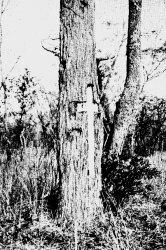PURSUIT OF LOBENGULA (5)
Three men, however, got away. An American and two Australians galloped unscathed through the Matabele line, threw off their pursuers by doubling on their tracks and reached the bank of the Shangani in safety. Shortly after leaving the patrol they heard heavy firing and the shouting of hundreds of warriors as they attacked Wilson and his men. When they reached the river they saw that there was no hope whatever for the patrol. Heavy rains upstream had swollen the waters of the river and now it was in flood, and rising every minute. They managed to get across only with the greatest difficulty.The subsequent fate of the Wilson patrol, whose bones now rest beneath their memorial on the Matopo hill on which Cecil Rhodes lies buried, was gathered afterwards from Matabele sources. They had selected a clearing among the trees for their last stand and, some standing, some kneeling, poured a hot fire in all directions. The Matabele had the advantage of better cover and took time to aim accurately and make their shots tell. But so calmly and steadily did the patrol fight back that in spite of the bush and the trees they took a heavy toll of the enemy.

|
There were no survivors, and this is the proud epitaph on their memorial. No one knew of their fate until two months later, when James Dawson, the trader, was led to the spot by a party of natives and found their skeletons. The trees all round were scored by bullet marks. The Matabele spoke of them reverently and had been so impressed by their bravery that they had refrained from mutilating their bodies and had left them where they fell. Dawson dug a large grave and gave them temporary burial close to a tree on which he cut a cross and the words, "To Brave Men". Their bones were later interred at Zimbabwe, since they had all come from Fort Victoria, and in 1904 removed to the Matopos, to the hilltop "consecrated and set apart for ever for those who had deserved well of their country." |
The night before this fateful day of December 4, 1893, Lobengula, accompanied by three of his sons, some of his wives and a few faithful indunas, including Mjaan, lumbered northwards in his wagon. He no longer feared pursuit, but he was a broken man, sick in body and soul, and with his kingdom destroyed he had no will to live. They got to within forty miles of the Zambezi, and there they ran into a belt of tsetse fly.
The oxen perished and in that inhospitable country they were stranded. Lobengula died towards the end of January, and the evidence found on his grave site when it was officially discovered and examined in 1946 suggests that he took poison.
So passed the last of the great native despots of Southern Africa, son of Mzilikazi who was one of Shaka's Generals. the founder of the Matabele nation . And as he died one wonders whether he remembered the prophetic words he had uttered to Thomas Baines more than twenty years before: "You may promise fairly now, but in future time when you are strongly established you may forget your promise and exceed the liberty I have given." He knew then that, inevitably, his way of life was doomed.